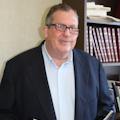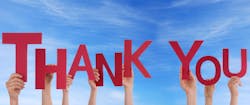16 ways dental authors wrote about 'thank you' in 2016
As we close out 2016, we thought it would be nice to acknowledge authors who had something to say about the words “thank you.” The list below is in chronological order, starting with the most recent articles and ending with articles published when 2016 was still young.
Click on the linked references to “thank” below to read the entire article.
1.
Background: The “godmother of dental hygiene,” Dr. Esther Wilkins, passed away on Dec. 12. The California Dental Hygienists’ Association shared this sentiment:
“We will hold Esther in our hearts forever and thank her for all she meant to our profession and to the countless dental hygienists across the country.”
----------------------------
2.
Background: Temporary hygienist has trouble finding the instruments. When she finds them, there appears to be an infection control breach. Noel Kelsch, RDHAP, who is an infection control columnist for RDH, wrote in October about making observations on infection control procedures in offices visited on a temporary basis. She suggests discussing potential red flags with the doctor in charge. Being nice about it goes a long way in facilitating these conversations:
But how do we put this into place? For example, let's imagine a conversation with the doctor on this subject. I would say, "Doctor, I know that keeping patients safe is your utmost concern. I also want to support you in that goal. I have a couple of ideas for the office and wanted to share them directly with you." I would then share an article, state practice act, CDC guidelines, etc., on storing instruments. I would close by saying, "Thank you for caring about patients and staff. I am so glad we have the same goals."
----------------------------
3.
Background: The Award of Distinction is an award cosponsored by RDH and Sunstar Americas. After an award ceremony at RDH Under One Roof, RDH published an article in the September issue introducing the recipients to its audience. A quote from Jackie Sanders, RDH, appears in the article. This quote was lifted from her speech at the awards ceremony:
"Each of you makes a difference in eight to 16 lives per day. You review health histories, take an individual's health care into your own hands, and make recommendations that may change a patient's life forever. After caring for others all day, many of you will go home to take care of family or care for other commitments, and seldom do you receive the thank you and appreciation you deserve."
----------------------------
4.
Background: Sometimes, when we’re frazzled, we take shortcuts in our speech, saying things that are clipped and somewhat impersonal. In August, Eileen Morrissey, RDH, wrote about the “thoughtful use of words” for RDH magazine:
Patients thank us all the time, but how often do we express gratitude? "Thank you for coming in today, Susan. I'll look forward to seeing you in four months!" sounds more upscale than the old "See ya' in six."
----------------------------
5.
Background: Helen Funk is an office manager who is very experienced in making case presentations. She also knows very well the benefits of using technology in prompting patients to accept treatment recommendations—an approach that can leave out the personal connections to patients. In this article for DentistryIQ.com in August, Funk also knows that gratitude should be extended to dental patients:
Showing gratitude comes in many forms. You can provide gratuity such as a gift card to those who refer patients to the office, personally thank your patients for their decision to choose you as their dental provider, or you can offer a complimentary service such as in-office whitening for those completing large treatment cases.
----------------------------
6.
Background: Kyle Isaacs, RDHEP, and Debbie Zafiropoulos, RDH, teamed up to write about organizing outreach efforts for the July issue of RDH magazine. Volunteers, of course, make these programs work successfully. The authors point out that a “thank you” to the volunteers who share their time and expertise is needed:
Most important, don't forget to say thank you to everyone who helps make the event successful. Everyone wants to feel acknowledged, from the lady who made homemade soup to the volunteers who drove 90 minutes to learn how to do an optimized SOSA screening.
----------------------------
7.
Background: In June, Polly Ward, RDH, wrote about an inspirational event that occurred in her office. A young patient gave thanks to a veteran who was also a patient. The young man wrote:
“Its amazing that you survived all that happend (sic) to you in WWII. I really liked your stories and am glad I got to meet you today. My dad was in the army. Thank you for your service, It means a lot to me.”
----------------------------
8.
Background: Dr. Pamela Maragliano-Muniz wrote about her experiences visiting dental manufacturers for insights on how dental products are made. Her June article reminded us to be thankful for the products available to us.
Thank you to GC America, Procter & Gamble, and Ivoclar Vivadent for taking the time to show me around and to my mentor, who taught me early to "respect the materials that I work with." I’m a better dentist for it.
----------------------------
9.
Background: Linda Meeuwenberg, RDH, wondered about a list of things to do for creating a “positive dental office environment.” Her June article in RDH included the reminder to express gratitude to colleagues who take the extra step with patients.
It's the little things that matter, especially over time, such as a simple note next to someone's work area or coffee mug expressing appreciation. If it's related to a specific event, the appreciation is even more powerful: "Thank you, Nancy, for helping get your elderly patient safely to her car. You are a great asset to our practice."
----------------------------
10.
Background: Eileen Morrissey, RDH, treats a transgender patient. When the patient is seated, the author notes the physical changes that have occurred with the patient. It was a dental appointment, however, and the dental hygienists began explaining the effects of hormone modification or oral health. The patient’s appreciation of appointment caused us all to pause, as Eileen noted in her June article for RDH:
It was an adjustment to see what I had known as Ken's face and appearance with a longer, feminine hairstyle, smoother skin and makeup, and breasts that were very obvious. She was carrying a purse and garbed in a dress. She sat down and the first thing she did was thank me for being willing to treat her. She said that others in her medical community had shunned her, which I found surprising.
----------------------------
11.
Background: In April, Suzanne Hubbard, RDH, wrote an article titled, “The head and neck exam: Only 25% of dental hygienists provide the service. Why?” One patient, Linda, was definitely very appreciative of the screening:
To anyone observing Linda, she is the picture of health. However, while I was performing a head and neck examination on Linda recently, she presented with a half-inch nodule on the right side of her thyroid. Strange, it wasn't there six months ago, I thought. I informed Linda of this new development and instructed her to see her general physician. Three weeks later I received a bittersweet phone call. "Thank you for your thorough exam. I wanted to let you know I have thyroid cancer."
----------------------------
12.
Background: Patients sacrifice their time to receive dental care. Jeanne Giovenco, CDPMA, wrote about retaining dental patients in a March article on DentistryIQ.com. Naturally, extending sincere compliments to patients work wonders:
Making a comment as opposed to asking questions can still effectively show care and concern. These comments can be as simple as, “It's good to see you today,” “What a nice hairstyle,” or “Thank you for being on time.” The goal is to make your patients feel appreciated and help alleviate their stress when they enter the office. When this happens, patients notice, and if they sense that you truly value them, why would they go anywhere else?
----------------------------
13.
Background: Eileen Morrissey, RDH, wrote about the way we treat elderly female patients. They can be challenging patients to treat. She quoted her mother in this article in the March issue of RDH:
To quote my own mother (also named Eileen Morrissey), age 90: "I don't need any young whippersnapper in a doctor's office calling me by my first name. I'm Mrs. Morrissey, if you please, and I thank you for referring to me in that manner."
----------------------------
14.
Background: In the February issue of Dental Economics, Andrew Hinrichs, CPA, wrote about practice management reports available for daily reviews in dental offices. But sometimes the personal touch can reveal far more than the spreadsheets:
The quicker you can thank your patients for their referrals, the better off you are. Why? Well, it's simple. Gratitude is the currency of life. Most of your patients don't receive enough gratitude in their lives. Set yourself apart from the pack and send them a simple letter that same day.
----------------------------
15.
Background: Gary Kadl, the CEO of Next Level Practice, reminded dentists not to step “over dollars to get to pennies.” One type of “destructive expense” is the talented employee who influences results with negative attitudes. So a conversation about job performance is necessary, which is not a happy occasion for either party. In this January article in Dental Economics, Kadl suggests being nice to the employee in an effort to figure out what’s wrong in a troublesome situation:
Genuinely acknowledge the person. "I want to thank you, Debbie, for being a valued team member and for your contribution over the last 10 years."
----------------------------
16.
Background: Jannette Whisenhunt, RDH, also wrote about employees struggling to keep up with the demands of the job in the January issue of RDH. Tardiness puts everyone behind, and Whisenhunt reminds readers to be thankful to the colleagues who cover for us:
Some examples include: showing up late in the morning or after lunch, not apologizing for lateness, not calling if you don't show up for work, calling in sick when you aren't, texting, using Facebook, etc. Behaviors like these are disrespectful. Saying "thank you" when others cover for you if you are late can go a long way, but don't overdo it. Being late should be the exception—not the rule.
----------------------------
For the most current dental headlines, click here.
About the Author

Mark Hartley
Mark Hartley is the editor of RDH magazine and collaborates with Kristine Hodsdon on many of the articles for RDH eVillage, which also appear on DentistryIQ.com.
